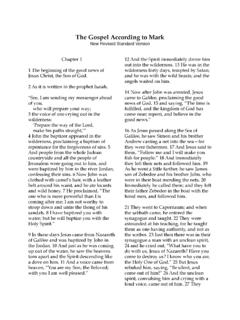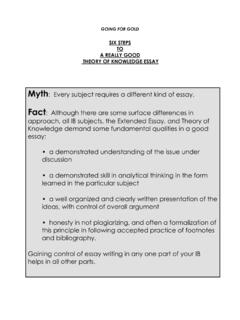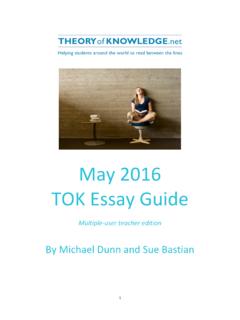Transcription of The Think Piece: A Guide The Form - Richard S Cohen
1 The Think Piece: A Guide The Form Think pieces are short essays of at least 500 words. I place no upper limit on length. However, I will penalize you if your essay is long and filled with empty verbiage. Given that Think pieces are short, they must be tight. Every word counts. Your Think piece should have a distinct point of view. Even more importantly, it must present this point of view clearly and consistently. I cannot emphasize enough that murky Think pieces essays that jump from point to point with no clear organization fall short of my basic expectation. Although I require Think pieces to be well organized and coherent, as a form, the Think piece allows you to experiment with modes of writing as well as with ways of addressing problems.
2 You might write a formal essay, citing sources. You are permitted to use the personal I ;. you are permitted to tell stories; you might even write a poem. But here's a warning. Whatever form your Think piece takes, it will be judged first and foremost by its success at elucidating the class' subject matter. In short, your Think piece must deal in a clear and intelligent way with the course readings. Beyond that requirement, you have a great deal of latitude in how you execute the assignment. The Question Most of the time I pose a specific question for you to answer as part of the assignment. Occasionally I invite you to pose a question of your own.
3 If I ask a question, then make sure your essay addresses the question. It is not enough for you to Think that the connection between my question and your answer is clear. I have to Think this as well. Make sure the connection is explicit. If you pose a question of your own, make sure it is a conceptually rich one. This is a class on religion not physics, mathematics, sociology, political science, or American history. Frankly I do not care what professors in those other disciplines regard as appropriate ways of approaching knowledge. Here, I want you to pose questions that inquire into, or test, meaningfulness.
4 Beyond an engagement with mere data, your questions should lead you to make intellectually sound, and academically appropriate, judgments of value. The Essay There are many factors that go into a superior essay, no matter what class you are in. These factors include: the quality, depth, and complexity of the argument; the use of evidence to support the thesis; the clarity and elegance of the prose. These are important considerations for how I assess your Think pieces . Beyond such baseline expectations, I also judge a Think piece by asking myself whether it is intellectually stimulating. Here's where the assignment gets tricky.
5 Many students seem to imagine that professors have a secret formula or secret set of expectations for students to meet; and that if students say just the right thing in just the right way, they will get an A.. In my classes, students who take a formulaic approach to the assignments usually do no better than a B. Do not try to second-guess me. Do not try to tell me what you Think I want to hear. Instead, tell me what you know. Start from what you know; who you are; your experiences and your interests. Communicate your own personal groundwork of insights to me through a discussion of the course's reading.
6 How do you do this? Write a synthetic essay, not an analytic one. Analysis is the process of breaking something down into its basic parts. Synthesis, by contrast, is a process of combining separate elements to create a new complex entity. An analytic essay explains a subject matter in its own terms; it draws out and clarifies the main points of a problem in ways that are intrinsically related to that problem. A synthetic essay, by contrast, elucidates a problem using terms that have no necessary relation to the original terms of the problem; it draws connections between otherwise separate bodies of knowledge.
7 One might observe say that Dr. Frankenstein analyzed the bodies of several corpses which gave him the raw materials with which to synthesize the body of his monster. Indeed, analysis must always precede synthesis. In order to write intelligently about a subject matter, you must first understand what you are writing about. However, a superior paper will engage in synthesis as well. That is to say, a superior paper will go beyond the evident facts about a subject to create something new, to show intellectual connections that are not evident or inherent in the subject matter itself. You cannot get a + unless you engage in synthesis.
8 Synthesis alone, however, will not guarantee a +. The Grade All papers are judged by the clarity and elegance quality of their writing. Being innovative and intelligent is not enough. Strive to be a good writer! + reserved for insightful Think pieces that demonstrate their authors' ability to draw interesting connections between distinct concepts in the pursuit of new knowledge. The ability to Think synthetically is an above average skill: it is rewarded accordingly. (Equivalent to A+, A, or A-). is intermediate. It represents an especially analytic paper, or a somewhat deficient example of synthetic work.
9 (Equivalent to A- or B+). is bestowed upon Think pieces that demonstrate their authors' ability to understand and analyze the subject matter. Some readings are quite difficult, and it can sometimes be a challenge just to make sense of them. Nevertheless, the ability to make sense of difficult material is the basic skill you are expected to develop as a college student. The development of that skill does not earn special credit. (Equivalent to B+, B, or B-). is an intermediate grade. It represents a lower than average analysis. (Equivalent to B- or C+). - is given to Think pieces that are neither synthetic nor effectively analytic.
10 There are many different ways in which a Think piece can fall short of expectations. If you receive this grade, I would advise you to come speak with me about why I found your work deficient. (Equivalent to C+, C, C-). If your Think piece has no notation, it means either that you have received an F or that I. have forgotten to record the grade. In either event, please come speak to me.










